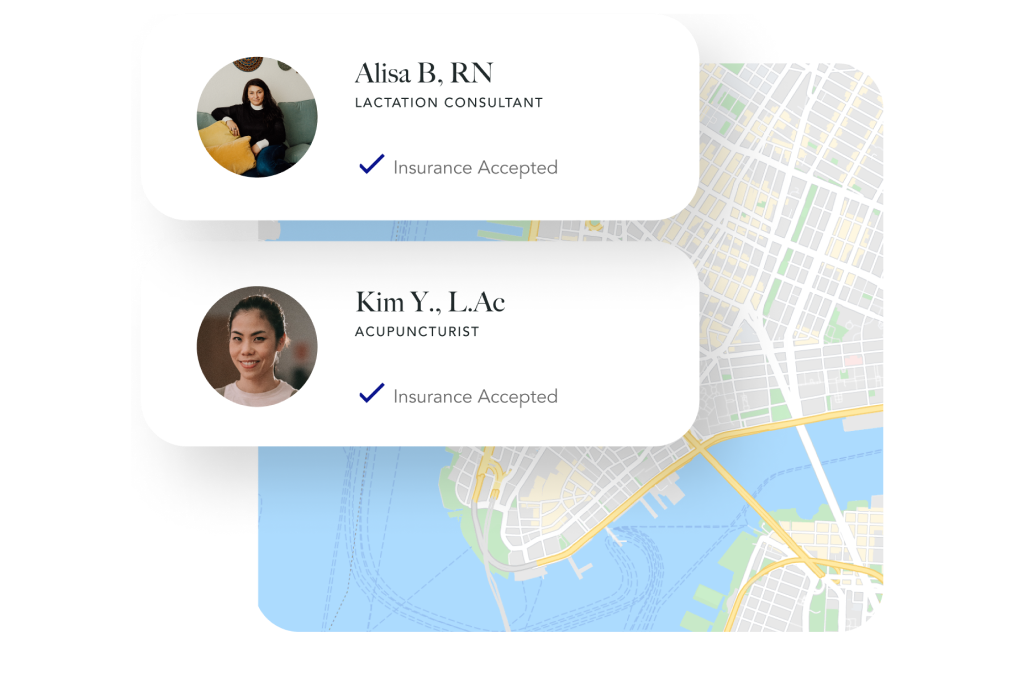
Our Specialties
Find Diabetes Dietitians Near Me
90% of Zaya patients pay $0 for one-on-one nutrition counseling with a registered dietitian.
Find Diabetes Dietitian Near MeBrowse our directory of diabetes dietitians — and book your visit online using your insurance.

Find the right care for you.

Pay with your insurance.

Book your visit online.
Get a provider who gets you.
Our providers are nutrition experts and take the time to get to know you and your needs.
Real talk from real patients.
Have questions? We’ve got answers.
For more information about how Zaya works, check out our frequently asked questions.
View FAQsMore about diabetes & our diabetes dietitians
What is diabetes?
Diabetes is a chronic medical condition characterized by high blood glucose (sugar) levels. There are two main types of diabetes: Type 1 diabetes and Type 2 diabetes.
Type 1 diabetes, also known as insulin-dependent diabetes, occurs when the body’s immune system mistakenly attacks and destroys the insulin-producing cells in the pancreas. Without sufficient insulin, which is necessary for regulating blood sugar levels, glucose cannot enter the body’s cells for energy.
Individuals with Type 1 diabetes require lifelong insulin therapy to manage their blood sugar levels. Diabetes typically develops in childhood or adolescence but can occur at any age.
Type 2 diabetes, the most common form of diabetes, develops when the body becomes resistant to the effects of insulin or fails to produce enough insulin to maintain normal blood sugar levels.
Risk factors for Type 2 diabetes include obesity, a sedentary lifestyle, genetic predisposition, and specific ethnic backgrounds. Lifestyle modifications, such as adopting a healthy diet, increasing physical activity, and, in some cases, taking oral medications or insulin, are key components of managing Type 2 diabetes.
This type of diabetes is often diagnosed in adulthood, but it is becoming more prevalent in younger populations due to rising obesity rates.
What is prediabetes?
Prediabetes occurs when blood sugar levels are higher than normal but not yet high enough to be diagnosed as Type 2 diabetes. It is often a precursor to the development of Type 2 diabetes. Individuals with prediabetes have impaired glucose tolerance or insulin resistance, which means their body is not effectively using insulin to regulate blood sugar levels.
A biomarker is a measurable indicator that provides information about an individual’s biological state or condition. It can be a specific molecule, gene, or characteristic that can be detected and measured in the body, such as blood, urine, or tissue samples. Biomarkers play a crucial role in diagnosing, monitoring, and predicting the progression of diseases.
Several biomarkers can help identify individuals at increased risk of developing Type 2 diabetes. The most commonly used biomarkers include:
- Fasting plasma glucose (FPG). FPG measures the glucose concentration in the blood after an overnight fast. Prediabetes is typically diagnosed when FPG levels are between 100 to 125 mg/dL.
- Oral glucose tolerance test (OGTT). OGTT involves measuring blood glucose levels before and two hours after consuming a glucose-rich drink. Prediabetes is diagnosed when the two-hour plasma glucose level falls between 140 to 199 mg/dL.
- Glycated hemoglobin (HbA1c). HbA1c reflects average blood glucose levels over the past two to three months. Prediabetes is often defined by an HbA1c level between 5.7% to 6.4%.
What causes diabetes?
Type 1 diabetes is caused by an autoimmune response in which the body’s immune system mistakenly attacks and destroys the insulin-producing cells in the pancreas. On the other hand, Type 2 diabetes is primarily influenced by lifestyle factors and genetic predisposition. Here are the causes for each type:
Type 1 diabetes:
- Autoimmune response. The immune system mistakenly attacks and destroys the insulin-producing beta cells in the pancreas.
- Genetic susceptibility. Certain genes are associated with an increased risk of developing Type 1 diabetes.
- Environmental factors. Viral infections or exposure to certain toxins may trigger the autoimmune response.
Type 2 diabetes:
- Insulin resistance. The body becomes resistant to the effects of insulin, leading to elevated blood sugar levels.
- Insufficient insulin production. The pancreas does not produce enough insulin to meet the body’s needs.
- Genetic factors. Family history and genetic variations can increase the risk of Type 2 diabetes.
- Obesity and overweight. Excess body weight, especially abdominal fat, contributes to insulin resistance.
- Sedentary lifestyle. Lack of physical activity and prolonged sitting can increase the risk of Type 2 diabetes.
- Unhealthy diet. Poor food choices, high intake of sugary beverages, and a diet high in processed foods contribute to developing Type 2 diabetes.
- Aging. The risk of Type 2 diabetes increases with age, especially after age 45.
- Ethnicity. Certain ethnic groups, such as African Americans, Hispanic/Latino Americans, Native Americans, and Asian Americans, have a higher predisposition to Type 2 diabetes.
- Gestational diabetes. About 50% of women with gestational diabetes during pregnancy, later on develop type 2 diabetes.
What are the symptoms of diabetes?
Type 1 diabetes and Type 2 diabetes present with different symptoms. In Type 1 diabetes, the symptoms usually appear suddenly and can be severe, while Type 2 diabetes symptoms may develop gradually and be milder initially. Here are the symptoms for each type:
Type 1 diabetes symptoms
In addition to the symptoms listed below, those with Type 1 diabetes may experience nausea, vomiting, or abdominal discomfort. Further, the onset of Type 1 diabetes symptoms can occur rapidly within a few weeks or months and is often characterized by their severity.
While Type 1 diabetes typically begins during childhood, adolescence, or early adulthood, it can manifest at any age.
Symptoms of Type 1 diabetes include:
- Increased thirst. Feeling extremely thirsty and needing to drink more fluids.
- Frequent urination. Urinating more often than usual, including waking up during the night to urinate.
- Extreme hunger. Experiencing constant hunger and craving for food.
- Unintended weight loss. Losing weight despite increased appetite and food consumption.
- Fatigue. Feeling tired and lacking energy.
- Blurred vision. Experiencing blurry vision or changes in vision.
- Irritability. Having mood swings, feeling irritable, and having trouble concentrating.
- Yeast infections. Developing frequent yeast infections in both males and females.
Type 2 diabetes symptoms
The symptoms of Type 2 diabetes typically manifest over an extended period, often spanning several years. In some cases, individuals may not experience any noticeable symptoms.
While Type 2 diabetes commonly develops in adulthood, there is an increasing prevalence among children and teenagers.
Symptoms of Type 2 diabetes include:
- Increased thirst. Feeling constantly thirsty and needing to drink more fluids.
- Frequent urination. Urinating more often than usual, including waking up during the night to urinate.
- Increased hunger. Experiencing persistent hunger and a strong desire to eat.
- Fatigue. Feeling tired and lacking energy throughout the day.
- Blurred vision. Experiencing blurry vision or changes in vision.
- Slow-healing sores. Cuts, bruises, or wounds taking longer to heal.
- Tingling or numbness. Feeling tingling, numbness, or pain in the hands or feet.
- Recurring infections. Developing frequent infections, such as urinary tract infections or skin infections.
- Darkened skin patches. Having patches of darkened skin, typically in the armpits and neck, known as acanthosis nigricans.
- Erectile dysfunction (in men). Having difficulty achieving or maintaining an erection.
What are the risks of diabetes?
Individuals with diabetes face various health risks and complications that can significantly impact their well-being. Here are some common risks associated with diabetes:
- Heart disease and stroke
- Kidney disease
- Eye problems and vision loss
- Nerve damage (neuropathy)
- Foot problems, including infections and amputations
- Skin conditions and infections
- Dental problems
- Mental health disorders, such as depression and anxiety
- Sexual and reproductive health issues
- Increased susceptibility to infections
When to see a diabetes dietitian
You should consider working with a diabetic nutritionist if you:
- Have been diagnosed with prediabetes or Type 2 diabetes. Managing your diet is crucial in preventing or managing the progression of these conditions.
- Are newly diagnosed with Type 1 diabetes. Nutrition guidance can help you navigate the dietary adjustments necessary for insulin management.
- Struggle with blood sugar control. A diabetic nutritionist can help you develop a personalized meal plan to stabilize your blood sugar levels.
- Need assistance with weight management. Achieving and maintaining a healthy weight is vital for diabetes management, and a nutritionist can provide guidance and support.
- Want to improve your overall dietary habits. A diabetic nutritionist can help you make healthier food choices, develop balanced meal plans, and establish sustainable eating habits.
- Have trouble managing carbohydrate intake. Carbohydrate counting and portion control are essential skills for diabetes management, and a nutritionist can teach you effective strategies.
- Have specific dietary concerns or restrictions. If you have food allergies, intolerances, or cultural preferences, a nutritionist can help you navigate these challenges while maintaining optimal nutrition.
- Require support for meal planning and grocery shopping. A diabetic nutritionist can assist you in creating meal plans, making grocery lists, and selecting appropriate food options.
- Want to optimize your overall health and well-being. A diabetic nutritionist can provide education, motivation, and accountability to help you achieve your health goals and improve your quality of life.
While individuals with prediabetes and Type 2 diabetes may have a higher likelihood of working with a nutritionist, individuals with Type 1 diabetes can also benefit from the expertise and guidance of a diabetic nutritionist.
How Zaya Care’s diabetes dietitians can help
Zaya Care’s diabetic nutritionists play a crucial role in helping individuals with diabetes make informed dietary choices, achieve and maintain a healthy weight, manage blood sugar levels, and optimize their overall health and well-being. Their expertise and support can empower individuals to manage their condition through diet and lifestyle modifications successfully.
When working with a dietitian, the first appointment typically involves a comprehensive assessment to gather information about the individual’s medical history, lifestyle, current eating habits, and specific goals related to diabetes management.
The nutritionist will take the time to listen to the person’s concerns, understand their unique needs, and create a personalized plan based on this information. They may also assess the individual’s current nutrient intake and identify areas for improvement.
During the initial appointment, the nutritionist will discuss the person’s dietary preferences, any existing medical conditions or allergies, and their goals related to diabetes management. They will provide education on the principles of a healthy diabetic diet, including carbohydrate counting, portion control, and meal timing.
The nutritionist will work collaboratively with the individual to develop a well-balanced meal plan that meets their nutritional needs and aligns with their personal preferences and lifestyle.
Follow-up appointments are an essential part of the ongoing support provided by a diabetic nutritionist. These appointments monitor progress, address challenges, and adjust the individual’s plan.
The nutritionist may review food diaries, provide feedback and guidance, offer suggestions for incorporating new foods or recipes, and provide ongoing education on specific nutrients and their impact on diabetes management.
They can also help individuals navigate dining out or special occasions while maintaining their diabetes management goals.
Benefits of working with Zaya Care’s diabetes dietitians
Working with a Zaya Care diabetes nutritionist offers numerous benefits for individuals seeking guidance and support in managing their condition.
One of the primary advantages is receiving personalized guidance tailored to their specific needs and goals. Diabetes nutritionists consider medical history, lifestyle, food preferences, and cultural considerations to develop a customized nutrition plan.
This personalized approach ensures that dietary recommendations align with the individual’s unique circumstances, making implementing and sustaining long-term changes easier.
A key aspect of diabetes management is keeping blood sugar levels stable, and a nutritionist specializing in diabetes can provide valuable assistance in this area. They can help individuals understand the impact of different foods on blood sugar levels and provide strategies to manage carbohydrate intake, portion sizes, and meal timing.
By educating individuals on concepts such as the glycemic index/load and carbohydrate counting, nutritionists empower them to make informed choices about their diet to optimize blood sugar control.
Diabetes nutritionists play a crucial role in providing comprehensive nutritional education and guidance. They explain the role of various nutrients in diabetes, empowering individuals to make informed decisions about food selection, label reading, and healthy cooking methods. By imparting knowledge, nutritionists enable individuals to make confident and informed choices about their diet.
Additionally, Zaya Care nutritionists offer guidance on weight management strategies, including portion control, calorie balance, and mindful eating practices. Recognizing the significance of maintaining a healthy weight in diabetes management, nutritionists help individuals establish realistic weight loss goals, develop meal plans that support weight management, and provide ongoing support and accountability. Their expertise contributes to improved diabetes control, better overall health, and enhanced quality of life.
Working with a Zaya Care diabetes nutritionist offers diabetics many benefits, including personalized guidance, blood sugar management support, nutritional education, weight management strategies, and lifestyle integration. These benefits contribute to improved diabetes control, better overall health, and a higher quality of life.
If you have prediabetes, our dietitians can help you develop a prediabetes meal plan that can help stop or even reverse the progression.




